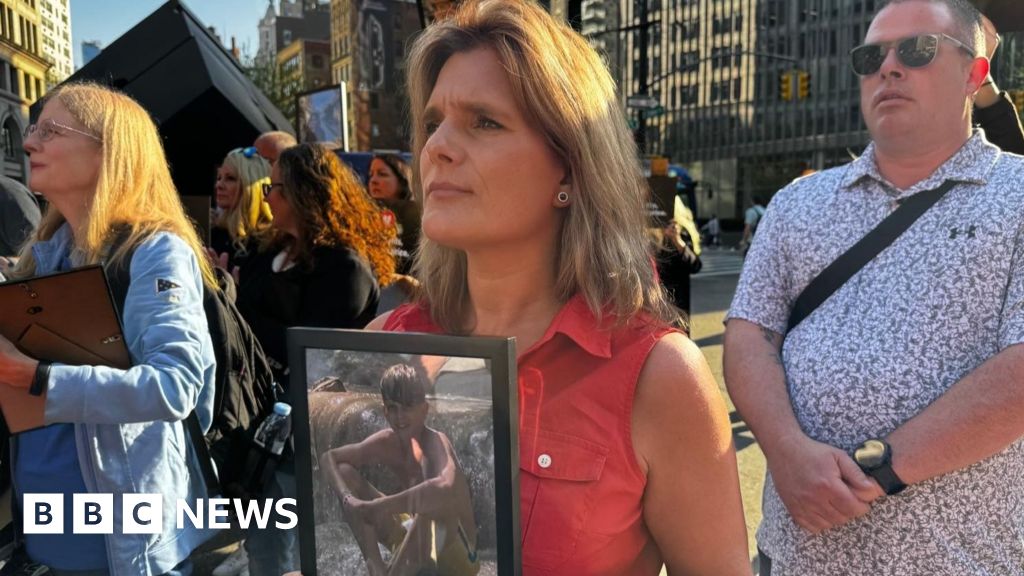Tragedy and Advocacy: Parents Unite Against Social Media’s Hidden Dangers
As the sun dipped below the skyline of New York City, a palpable sense of grief filled the air. Parents from across the Atlantic marched down Fifth Avenue, each clutching framed photos of their beloved children—lost, in part, to the dark underbelly of social media. “You don’t know what your children are looking at,” exclaimed Ellen Roome, whose 14-year-old son Jools Sweeney took his life, allegedly influenced by an online challenge. Joined by other parents, she implored tech giants to take accountability, turning personal tragedies into a united front against an unseen menace.
The Urgent Call for Action
In a world driven by likes and shares, the haunting testimonies of bereaved families are growing louder. Four families from the UK, including the Kenevans, traveled to New York to confront Meta, the parent company of Facebook and Instagram. The group believes that these platforms contribute to a culture that promotes dangerous challenges that could have devastating consequences for young lives. “All we’re asking for is can you please help us protect our children,” pleaded Mark Kenevan, father of the late Isaac, who died at the tender age of 13 after participating in a viral challenge.
Coinciding with this emotional protest, the UK’s media regulator Ofcom announced new regulations, effective July, aimed at blocking children’s access to harmful content online. Under these regulations, websites will be mandated to introduce stringent age checks and safeguards, reflecting an increasing societal concern for the mental well-being of children in the digital age.
Collective Grief, Collective Power
This gathering of frustrated parents wasn’t merely a protest— it was a movement born from shared anguish. Lisa Kenevan noted how their collective strength has amplified their voices. “Our voices are getting stronger, and we’re not going to go away,” she declared. These families are not alone; they are supported by a growing number of advocates and experts who echo their concerns about the inadequacies of current parental controls and platform regulations.
The Dark Mechanics of Engagement
A recent report from the Digital Safety Coalition indicates that as many as 70% of parents are unaware of the potential hazards their children encounter online. “Social media platforms, in their race for engagement, often sidestep the impacts of dangerous content,” explained Dr. Sarah Collins, a child psychologist specializing in digital behavior. “Manufactured challenges that encourage risky behavior can easily bypass parental controls, putting children at risk.”
- Increased visibility of self-harm and risky challenges on platforms like TikTok and Instagram.
- Lack of transparency in the algorithms promoting harmful content.
- Insufficient age verification methods leaving children exposed.
These statistics reinforce a critical need for reform and accountability in the tech industry. The psychological toll of exposure to harmful content can manifest in devastating ways, from anxiety to tragic outcomes as seen in the deaths of Isaac Kenevan and Maia Walsh, both victims of dangerous social media trends.
A Fight for Legacy
Liam Walsh, father of deceased 13-year-old Maia, emphasized the movement’s purpose: “We feel as though we’re getting recognition for what happened to our children. This is not just desperate parents clutching at straws.” With a wrongful death lawsuit against TikTok underway, Walsh and others seek to uncover the hidden influences their children faced online. The legal route is fraught with challenges, but it symbolizes a fierce desire for accountability and action.
Amidst the ocean of grief, there exist rays of hope. While families gather in memory of their children, their mission is to fortify protective measures for future generations. “I almost want to tell parents, ‘You don’t know what your children are looking at,’” Roome said, urging proactive discussions between guardians and their children about online safety.
Legislative Changes on the Horizon
Advancing their cause, these parents have begun to gather support for legislative changes that would grant them access to their children’s social media accounts posthumously, providing crucial insights into their children’s final days. “This isn’t for our children because it’s too late, but for them to have that conversation about what they are viewing,” Roome explained, her voice a combination of sorrow and determination.
As these families continue their fight—here on the bustling streets of New York or through legal channels—they are fueled by a singular vision: a safer online environment for all children. Their advocacy has begun to resonate with a wider audience, leading to increased public discourse around the necessity for better online safety regulations and mechanisms.
Platform Responses and Future Outlook
In response to the protests, companies like TikTok assert that they have implemented measures to remove harmful content before it gets reported. However, parents remain skeptical. “They tell us they have safeguards in place, but we need more robust action,” said Lorin LaFave, mother of Breck Bednar, who was lured to his death in a predatory online gaming situation in 2014. “We would love to see age restrictions for social media applications, as kids are exposed to adult content far too soon.”
As advocacy continues to intensify, it is clear that the battle against the pervasive dangers of social media is only beginning. Parents from both sides of the Atlantic stand firm, united in their quest for accountability, transparency, and most importantly, justice for the children lost to the hidden hazards of an increasingly digital world.
Source: www.bbc.com


